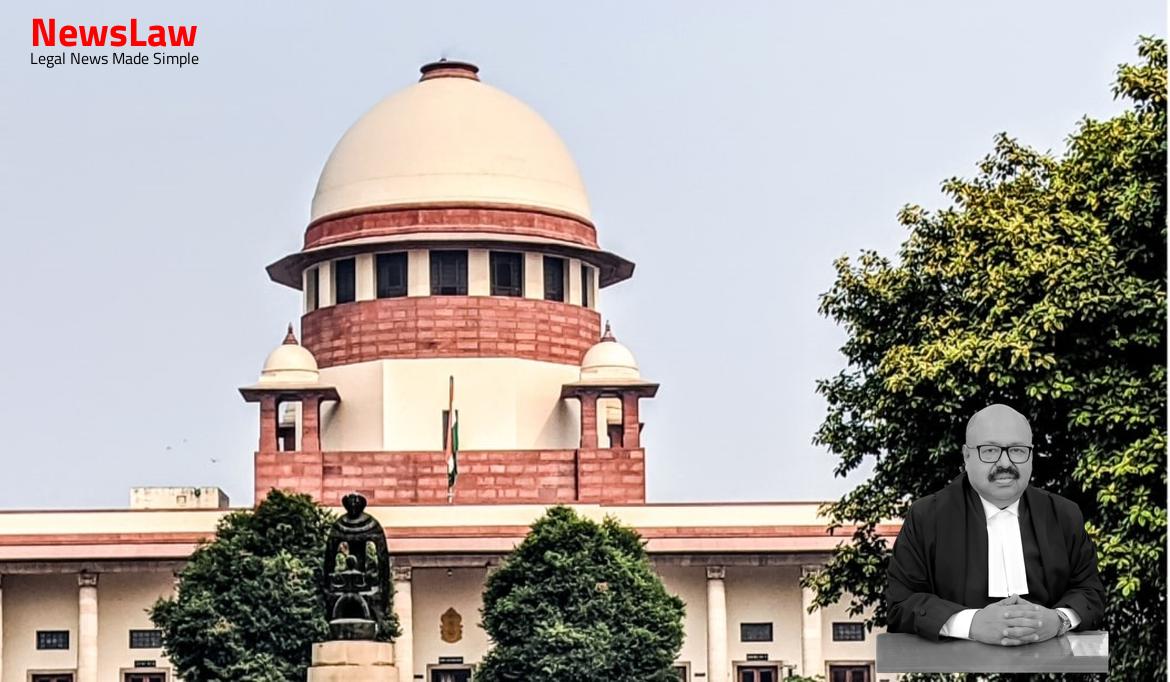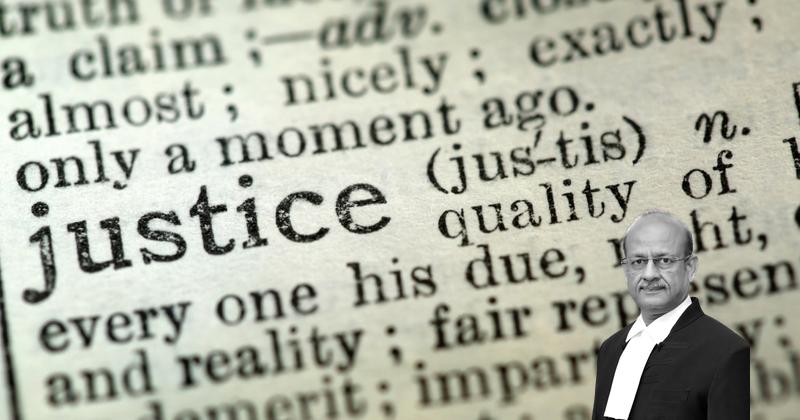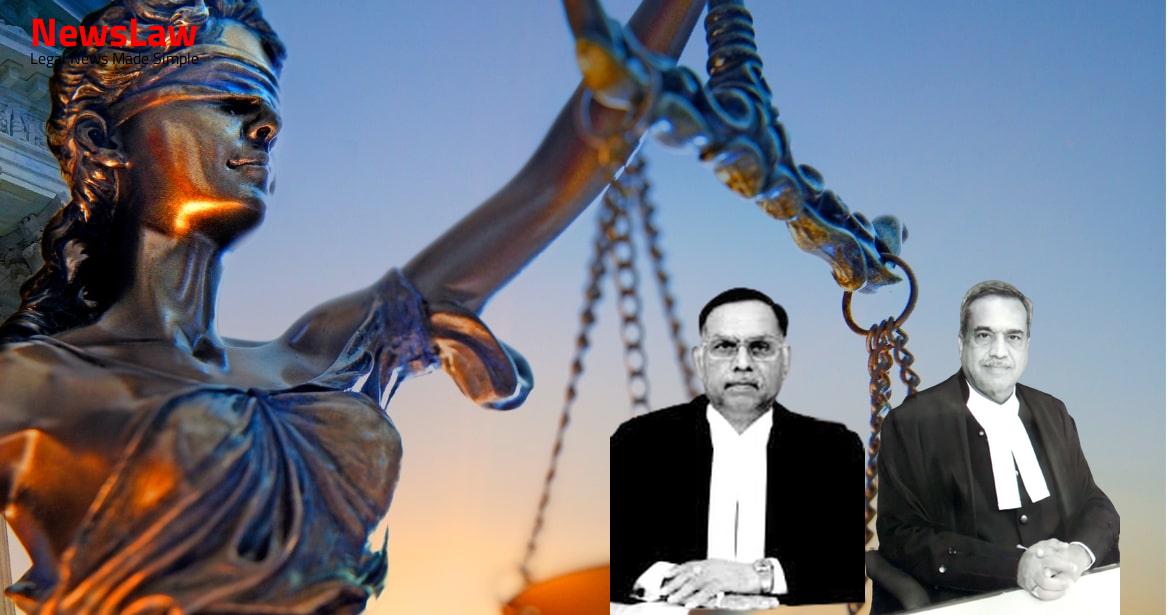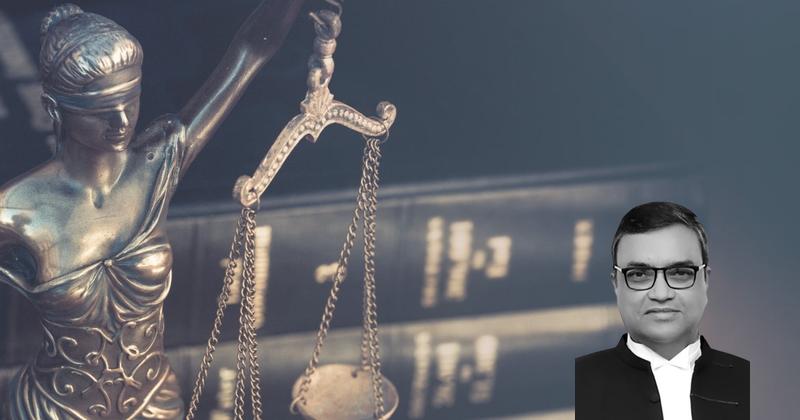Explore the in-depth legal analysis of eyewitness testimonies in a recent conviction case that highlights the significance of credible witness statements. The court’s meticulous examination of evidence and witness testimonies underscores the crucial role they play in determining guilt or innocence. Follow along to understand how the court’s scrutiny of eyewitness accounts led to a compelling conviction ruling.
Facts
- Bhawarlal arranged a bullock cart to take his injured father towards Narayangarh.
- No fracture was found in the injury listed at no. 1.
- Madhavji died on the way to Narayangarh.
- Bhawarlal and Babulal reached Narayangarh Police Station with the dead body within four hours of the incident.
- Four others charged under Section 506 IPC for obstructing and threatening the informant while proceeding with the injured in the bullock cart.
- The trial judge acquitted four individuals charged under Section 506 IPC as the charge of obstruction and threat was not proved.
- Six accused, including Lalu who died, were found armed with lethal weapons assembling to attack Madhavji.
- The death of Madhav was a result of the injuries inflicted by hard, blunt, and sharp-edged weapons along with shock.
- The distance between the police station and the spot where Madhavji was attacked is about 8 kilometers.
- Shyam Kala Bai (PW12), the daughter of the deceased, accompanied her injured father in the bullock cart and stated that Madhavji expired on the way to Narayangarh.
- The presence of the deceased’s daughter (PW3) at the spot of the attack was confirmed by eyewitnesses PW3 and PW11, whose testimonies corroborated each other.
- The defense version suggesting the injuries were due to an accidental fall into the Nullah was not found credible, as there was no suggestion that the injuries were not a result of a violent attack by the accused.
- The defense plea of false implication was rejected based on the eyewitness testimonies and post-mortem report, which did not support the claim.
- Contradictions in the evidence of DW1 and DW2 were noted by the trial court, with DW2 failing to report the alleged accident to the police as required by his duties as the village Chowkidar.
- DW2, the Chowkidar, and DW1’s testimonies were found untrustworthy, but DW1’s claim of witnessing the incident was consistent with the other eyewitnesses.
- The accused were found guilty of intentionally causing the fatal injuries to the deceased, leading to their conviction under Section 302 read with 149 IPC, with a sentence of life imprisonment and fines.
- For the conviction under Section 148 IPC, the accused were sentenced to three years of rigorous imprisonment with fines.
- The High Court upheld the trial court’s judgment, rejecting the appellant’s attempt to discredit the eyewitnesses and finding consistency in their testimonies with the medical evidence.
- The claim of false implication was dismissed by the High Court, and the appeal against conviction was also rejected.
Also Read: Insurance Claim Repudiation due to Fire Incident: Court’s Legal Analysis
Arguments
- Learned counsel argues that the bitter relationship between the two groups provides a motive for the accused to attack the victim.
- The counsel highlights that medical evidence and injuries align with the oral testimonies presented.
- Certain witnesses are noted to not fully support the prosecution’s version according to the counsel’s submission.
- Ms. Ankita Chaudhary, representing the State of Madhya Pradesh, contends that the evidence from 3 eyewitnesses unequivocally supports the prosecution’s case.
Analysis
- The court must determine if other available evidence comprehensively proves the charge when a related witness does not support the prosecution story.
- Past enmity alone is not enough to discredit a witness if they are otherwise trustworthy.
- Being related to the deceased does not automatically imply false implication of innocent persons.
- History of bad blood provides a clear motive for the crime.
- Material evidence and trustworthy testimonies exist to support the case against the accused despite some witnesses not supporting the prosecution.
- A witness is typically considered independent unless they have reasons, such as enmity, to falsely implicate the accused.
- Justice Vivian Bose in Dalip Singh & Ors. Vs. State of Punjab stated that the testimony of two eye-witnesses does not always require corroboration.
- In State of Uttar Pradesh vs. Samman Dass, it was noted that close relatives of a murdered person may falsely implicate an innocent person instead of the real culprit.
- In Khurshid Ahmed vs. State of Jammu and Kashmir, Justice N.V. Ramana emphasized that related witnesses can be reliable if found truthful, even if they are closely related to the deceased.
- The testimony of related witnesses, if found reliable, can serve as the basis for conviction, as seen in the case of PW3 and PW12 who identified the accused at the crime scene.
- In Sushil & Ors. Vs. State of U.P., Justice Faizan Uddin pointed out that enmity can both be a motive for the crime and for false implication, but motive gains importance when direct involvement of the accused is established.
- Interested witnesses and relatives of the deceased should not be dismissed solely based on their relationship, but their evidence should be carefully evaluated for reliability and corroborated by independent evidence to be accepted as reliable.
- The conviction of the appellants was rightly ordered and upheld by the High Court.
- The prosecution’s version was supported by three eyewitnesses who provided a consistent account of the incident.
- The learned Trial Judge carefully analyzed the evidence and rendered a logical conclusion.
- The testimonies of the eyewitnesses are further supported by medical evidence.
- The credibility of the hostile witnesses does not affect the conviction of the appellants.
Decision
- The appeal has been dismissed.
- The declaration has been made accordingly.
Case Title: KARULAL Vs. THE STATE OF MADHYA PRADESH HOME DEPARTMENT STATION OFFICER (2020 INSC 582)
Case Number: Crl.A. No.-000316-000316 / 2011



